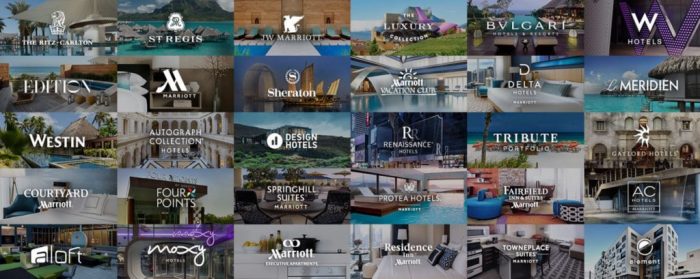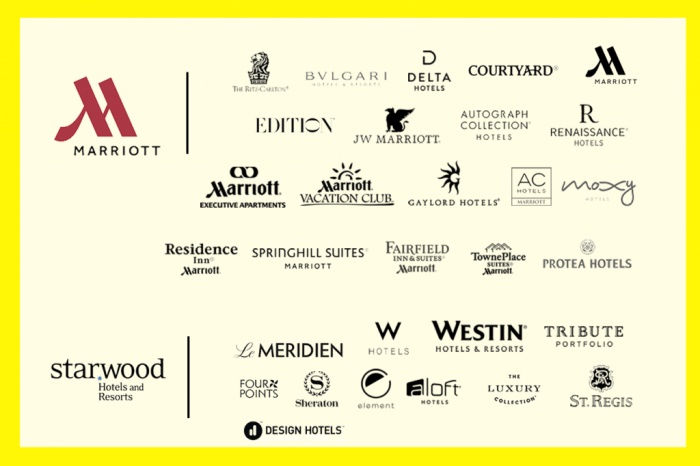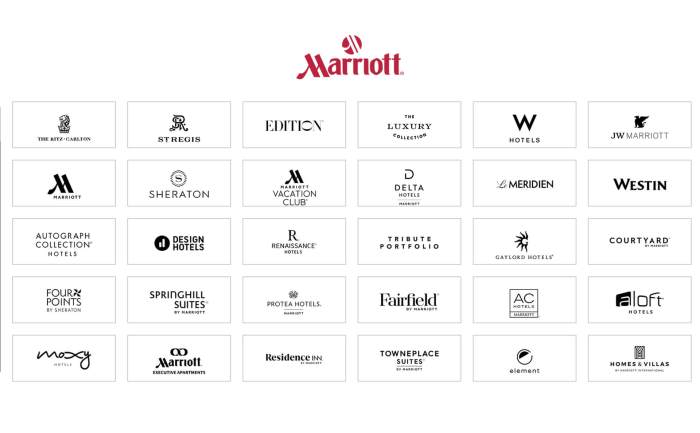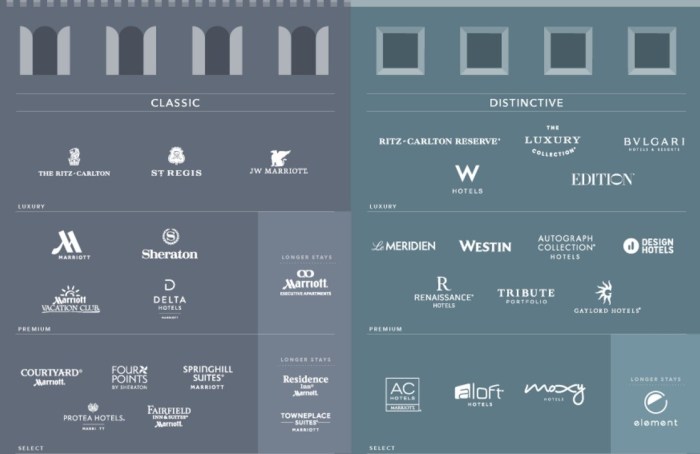Hotel chains owned by marriott – Welcome to the world of hospitality, where Marriott International reigns supreme with an impressive portfolio of hotel chains. From luxurious retreats to budget-friendly accommodations, Marriott’s diverse brands cater to every traveler’s need. Embark on a journey through the history, global presence, and brand positioning of these renowned hotel chains, and discover the secrets behind their unparalleled success.
Marriott’s acquisition strategy has played a pivotal role in its growth, shaping the hospitality landscape. Over the years, the company has strategically acquired key hotel chains, expanding its reach and solidifying its position as a global leader. Dive into the details of these acquisitions and explore the impact they have had on the industry.
Marriott International’s Hotel Brands
Marriott International, a global hospitality giant, operates an extensive portfolio of hotel brands catering to diverse traveler needs and preferences. These brands are strategically positioned across different market segments, offering a range of experiences and amenities to meet the evolving demands of today’s travelers.
Luxury Hotel Brands
Marriott International’s luxury hotel brands exude sophistication, exclusivity, and unparalleled service. These brands are designed to cater to discerning travelers seeking the highest levels of comfort, opulence, and personalized experiences.
- The Ritz-Carlton: The pinnacle of luxury, offering grand accommodations, impeccable service, and exceptional amenities.
- St. Regis Hotels & Resorts: Epitomizing elegance and bespoke experiences, with a focus on timeless traditions and modern sophistication.
- W Hotels: A vibrant and stylish brand, catering to trendsetters and those seeking a vibrant social scene.
- The Luxury Collection: A portfolio of distinctive hotels, each with its own unique character and rich history.
History and Acquisition of Marriott Hotel Chains

Marriott International’s impressive portfolio of hotel brands is the result of a series of strategic acquisitions and mergers over several decades. Through these transactions, Marriott has expanded its global reach, diversified its offerings, and cemented its position as a leading player in the hospitality industry.
The company’s acquisition spree began in 1985 with the purchase of the luxury hotel chain Ritz-Carlton. This move marked Marriott’s entry into the ultra-luxury segment and established its reputation for providing exceptional guest experiences.
Key Milestones
- 1985: Acquisition of Ritz-Carlton
- 1993: Merger with Marriott Corporation
- 1995: Acquisition of Courtyard by Marriott
- 1997: Acquisition of Renaissance Hotels
- 2001: Acquisition of Bulgari Hotels & Resorts
- 2005: Acquisition of Starwood Hotels & Resorts Worldwide
The merger with Marriott Corporation in 1993 brought together two of the largest hotel chains in the world, creating a formidable force in the industry. The acquisition of Courtyard by Marriott in 1995 further strengthened Marriott’s presence in the mid-priced segment, while the purchase of Renaissance Hotels in 1997 expanded its portfolio of upscale properties.
Marriott’s acquisition of Bulgari Hotels & Resorts in 2001 marked its entry into the ultra-luxury hotel market, catering to the discerning tastes of high-end travelers. The company’s most significant acquisition to date was the purchase of Starwood Hotels & Resorts Worldwide in 2005. This transaction added a diverse portfolio of brands to Marriott’s lineup, including Sheraton, Westin, and W Hotels, solidifying its position as the world’s largest hotel chain.
Global Presence of Marriott Hotel Chains

Marriott International’s hotel chains have a global presence, with properties located in over 130 countries and territories worldwide. The company’s portfolio includes a diverse range of brands, each with its unique target market and geographic reach.
The following table provides an overview of the global presence of Marriott’s hotel chains:
| Hotel Chain | Number of Properties | Geographic Regions | Key Markets |
|---|---|---|---|
| Courtyard by Marriott | 1,200+ | North America, Europe, Asia-Pacific, Middle East, Latin America | United States, China, India, United Kingdom, Germany |
| Fairfield Inn & Suites by Marriott | 1,000+ | North America, Europe, Asia-Pacific, Middle East, Latin America | United States, Canada, Mexico, United Kingdom, China |
| Residence Inn by Marriott | 800+ | North America, Europe, Asia-Pacific, Middle East, Latin America | United States, Canada, United Kingdom, China, India |
| SpringHill Suites by Marriott | 700+ | North America, Europe, Asia-Pacific, Middle East, Latin America | United States, Canada, Mexico, United Kingdom, China |
| TownePlace Suites by Marriott | 600+ | North America, Europe, Asia-Pacific, Middle East, Latin America | United States, Canada, Mexico, United Kingdom, China |
| Aloft Hotels | 200+ | North America, Europe, Asia-Pacific, Middle East, Latin America | United States, China, India, United Kingdom, Germany |
| Element by Westin | 100+ | North America, Europe, Asia-Pacific, Middle East, Latin America | United States, Canada, China, United Kingdom, Germany |
| W Hotels | 50+ | North America, Europe, Asia-Pacific, Middle East, Latin America | New York City, London, Paris, Tokyo, Dubai |
| The Ritz-Carlton | 100+ | North America, Europe, Asia-Pacific, Middle East, Latin America | New York City, London, Paris, Tokyo, Hong Kong |
Marriott’s global presence allows the company to cater to a wide range of travelers, from business executives to leisure tourists. The company’s hotels are located in major cities, resort destinations, and suburban areas, ensuring that there is a Marriott property to meet the needs of every traveler.
Brand Positioning and Target Audience

Marriott International’s hotel chains are meticulously positioned to cater to diverse customer segments and market niches. Each brand boasts a distinct identity and value proposition, ensuring a tailored experience for every guest.
Marriott’s brand positioning is driven by a deep understanding of customer needs and preferences. The company has meticulously segmented the market and developed a portfolio of brands that address specific demographics, lifestyles, and travel purposes.
Solo travelers can also find tailored experiences at resorts designed specifically for holidays for single people . And if you’re seeking some winter sun, explore the enticing destinations featured in our guide to winter sun holiday destinations . For a quick and rejuvenating escape, discover our recommendations for the best quick beach getaways .
Luxury Segment
Marriott’s luxury brands, such as The Ritz-Carlton, St. Regis, and W Hotels, are synonymous with opulence, exclusivity, and exceptional service. They cater to discerning travelers seeking the pinnacle of hospitality, offering opulent accommodations, world-class amenities, and personalized experiences.
Upper-Upscale Segment
The upper-upscale segment, represented by brands like JW Marriott, EDITION, and Autograph Collection Hotels, appeals to sophisticated travelers seeking a blend of luxury and comfort. These brands offer spacious guest rooms, elegant public spaces, and attentive service, catering to both business and leisure travelers.
Upscale Segment
Marriott’s upscale brands, including Marriott Hotels, Sheraton, and Westin, are designed for value-conscious travelers seeking a comfortable and reliable stay. They offer modern amenities, convenient locations, and a balance of comfort and affordability.
Mid-Scale Segment
The mid-scale segment, anchored by brands like Courtyard by Marriott, Fairfield Inn & Suites, and SpringHill Suites, targets budget-minded travelers and families. These brands prioritize functionality and efficiency, offering comfortable accommodations, complimentary amenities, and a convenient value proposition.
Extended Stay Segment
Marriott’s extended stay brands, such as Residence Inn by Marriott and TownePlace Suites by Marriott, cater to travelers seeking a home away from home. They offer spacious suites with fully equipped kitchens, separate living and sleeping areas, and extended amenities like complimentary breakfast and laundry facilities.
Loyalty Programs and Partnerships
Marriott’s loyalty program, Marriott Bonvoy, offers a comprehensive range of benefits and rewards to its members. Members earn points for every stay at Marriott hotels, which can be redeemed for free nights, upgrades, and other perks. Marriott Bonvoy also has elite status tiers, which offer additional benefits such as priority check-in, room upgrades, and bonus points.Marriott
has also partnered with a number of airlines, credit card companies, and other travel providers. These partnerships allow Marriott Bonvoy members to earn and redeem points on a wider range of travel experiences. For example, Marriott has a partnership with United Airlines, which allows members to earn United miles for every stay at a Marriott hotel.
If you’re looking for a luxurious and relaxing getaway, consider the Iberostar hotel chain . With resorts in some of the world’s most stunning destinations, Iberostar offers all-inclusive packages that cater to every need. For families seeking an unforgettable vacation, Club Med’s all-inclusive family resorts are a perfect choice, offering a wide range of activities and amenities for children and adults alike.
Partnerships
Marriott has partnered with various organizations to enhance the travel experience for its customers:
- Airlines:Partnerships with airlines like United Airlines, Delta Air Lines, and American Airlines allow members to earn and redeem points for flights and hotel stays.
- Credit Card Companies:Marriott has partnered with credit card companies such as American Express, Chase, and Visa to offer co-branded credit cards that provide bonus points and other benefits.
- Travel Providers:Marriott has alliances with travel providers like Hertz, Avis, and Uber, enabling members to earn points for car rentals and ride-sharing services.
Sustainability and Social Responsibility
Marriott International places a high value on sustainability and social responsibility, recognizing its impact on the environment and communities it operates in. The company has implemented comprehensive initiatives to minimize its environmental footprint, engage with local communities, and promote ethical sourcing.
Environmental Practices
Marriott has set ambitious environmental goals, including reducing its carbon emissions by 50% by 2030 and achieving net zero emissions by 2050. The company focuses on energy efficiency, water conservation, and waste reduction. It has invested in renewable energy sources, installed water-saving fixtures, and implemented comprehensive recycling programs.
Community Involvement, Hotel chains owned by marriott
Marriott believes in giving back to the communities it serves. The company supports various initiatives, including educational programs, disaster relief, and community development. Through its Serve360 platform, Marriott employees volunteer their time and resources to make a positive impact.
Ethical Sourcing
Marriott is committed to ethical sourcing practices throughout its supply chain. The company works with suppliers who adhere to high standards of environmental protection, labor practices, and human rights. Marriott also supports local businesses and promotes sustainable agriculture practices.
Competitive Landscape and Market Share
Marriott International operates in a highly competitive global hotel industry. The company faces competition from other major hotel chains such as Hilton Worldwide Holdings Inc., Hyatt Hotels Corporation, InterContinental Hotels Group PLC, and Accor SA. Each of these competitors has a strong brand presence, a wide portfolio of hotel properties, and a loyal customer base.In
terms of market share, Marriott International is the largest hotel chain in the world, with a global market share of approximately 15%. The company’s market share has been growing steadily in recent years, driven by its aggressive expansion strategy and its strong brand reputation.
Key Competitors
Marriott International’s key competitors include:
- Hilton Worldwide Holdings Inc.
- Hyatt Hotels Corporation
- InterContinental Hotels Group PLC
- Accor SA
These competitors offer a wide range of hotel brands and properties, targeting different customer segments and price points. Marriott International must constantly innovate and differentiate its offerings to maintain its competitive edge in the market.
Future Growth and Expansion Plans

Marriott International has ambitious plans for future growth and expansion, aiming to strengthen its global presence and cater to the evolving needs of travelers.
The company is exploring opportunities in emerging markets, particularly in Asia-Pacific and the Middle East, where demand for hotel accommodations is growing rapidly.
New Market Expansion
- Marriott is actively pursuing expansion in India, China, and Southeast Asia, where it sees significant growth potential.
- The company is also considering entering new markets in Africa and Latin America.
New Hotel Brands
- Marriott is developing new hotel brands to cater to specific customer segments and market niches.
- For instance, the company launched the Moxy brand in 2014, targeting millennials and budget-conscious travelers.
Acquisitions and Partnerships
- Marriott has a history of acquiring other hotel chains to expand its portfolio and gain access to new markets.
- In 2016, the company acquired Starwood Hotels & Resorts, making it the largest hotel company in the world.
Closing Summary: Hotel Chains Owned By Marriott

Marriott’s commitment to sustainability and social responsibility sets it apart as a responsible corporate citizen. The company’s initiatives in environmental practices, community involvement, and ethical sourcing align with the values of today’s travelers. As the hospitality industry continues to evolve, Marriott is poised to lead the way with innovative concepts and a focus on guest satisfaction.


